Jumanji: Welcome to the Jungle is not necessarily a “good” movie.
But it is a satisfying movie, and that may be what really matters.
To be fair, Jumanji (as we’ll call it from here on out) is not a complicated movie. As with most modern blockbusters, if you’ve seen the trailer, you’ve basically seen the whole movie.
(Oh, have you not seen the trailer? Here, watch the movie.)
Now, let’s be honest: I could point out 20 problems with the Jumanji script if I wanted to.
But it seems ludicrous to attack the plot holes in a film that’s made a billion dollars worldwide and is likely to become the global multimedia brand that defines Sony for the next 20 years.
So instead, I want to ask a different question:
How did a movie with a plot this thin, predictable, and low on logic become the biggest non-franchise (yet) hit of the past decade?
I mean, it made $10M in its 8th weekend. This never happens anymore — although, to be fair, not all box office records are created equal, either.
So why are so many people showing up to see this movie?
Because for everything Jumanji does predictably (or poorly), it gets the three most important aspects of any story right.
Here’s how it does that, and why it ultimately works so well.
* NOTE: Spoilers ahead for a movie whose ending you can guess just from the trailer. *
Clearly-Defined Audience Desires
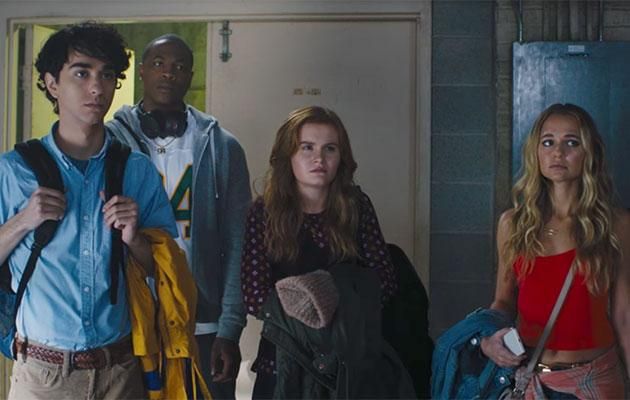
Don’t you forget about me… I’ll be alone… dancing, you know it baby
Note that I didn’t say clearly-defined character desires.
Why does this difference matter?
Because what a character wants matters less to the audience’s satisfaction than what the audience wants for those characters.
In the first act of Jumanji, we meet four main characters with clearly-defined desires:
- Spencer wants to be close friends again with Fridge, as they were in gradeschool
- Fridge wants to stay on the sports team that defines his self-image
- Bethany wants to get her ex-boyfriend back and continue to be popular
- Martha wants to get into an Ivy league college and leave the hell of high school behind
Later, we meet two supporting characters who also have clear desires:
- Alex, who wants to stay alive in Jumanji
- Alex’s father, who wants closure in the case of his son’s disappearance
Now, we could objectively look at each character’s desires and decide whether what they want is technically “good” for them, or “worth” wanting. But the characters’ internal motivations are not our motivations for caring about the story’s outcome.
So, what do we as the Jumanji audience want to see happen?

What character arc do we hope to see everyone achieve?
Regardless of what the characters want, we want…
- Spencer to stop being weak and indecisive
- Fridge to reconnect with Spencer and see himself as more than “just” a jock
- Bethany to care about literally any other human being
- Martha to expand her comfort zone
- Alex to get home safely
- Alex’s dad to realize his son has been alive all along
Do we want all the kids to escape from inside a cursed video game and get home safely?
Well, sure, but the game is just a MacGuffin — an excuse for a bunch of challenges to occur. What really matters is that the plot’s arbitrary challenges provide the characters with the means to achieve their (and/or our) desires.
But for that to happen, we need two more ingredients: we need to understand how the story’s world works, and we need to experience an emotional payoff that feels earned.
(All of this is part of three-act structure in screenwriting, which you can learn about here.)
The In-Game Rules of Jumanji Are Clearly Established
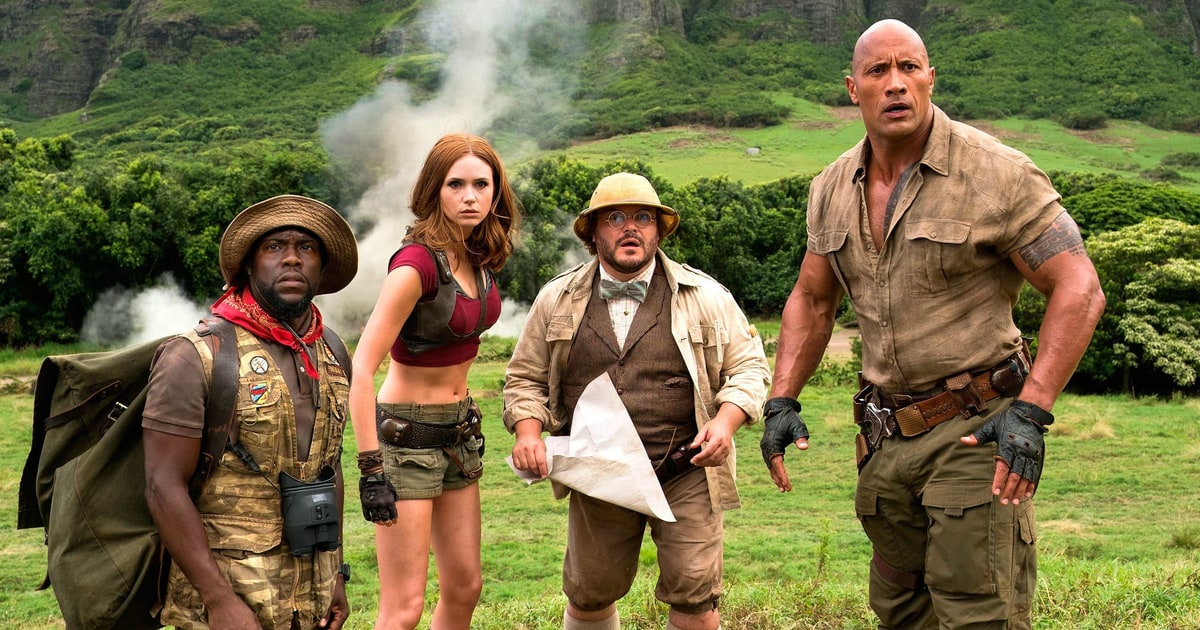
We’ve got fun and games
How and why do the kids get trapped inside the game?
It doesn’t matter.
Why does Van Pelt want to rule Jumanji as a villainous tyrant?
It doesn’t matter.
What happens if the kids don’t return the jewel to its rightful place?
It doesn’t matter.
Here’s the thing about worldbuilding that many authors don’t realize: the only worldbuilding details that really matter are the ones that directly affect the story’s outcome.
In the case of Jumanji, we only need to understand a few specific rules of the game:
- The teens are playing the game as avatars with specific skills and weaknesses
- Each avatar has three lives, which appear as a tattoo countdown on their arms
- When an avatar “dies,” it respawns a few moments later in roughly the same place
- If a player’s avatar loses all three lives, s/he [presumably] dies for real
Literally everything else is just a plot device intended to help our characters achieve their (or our) desires.
For example…
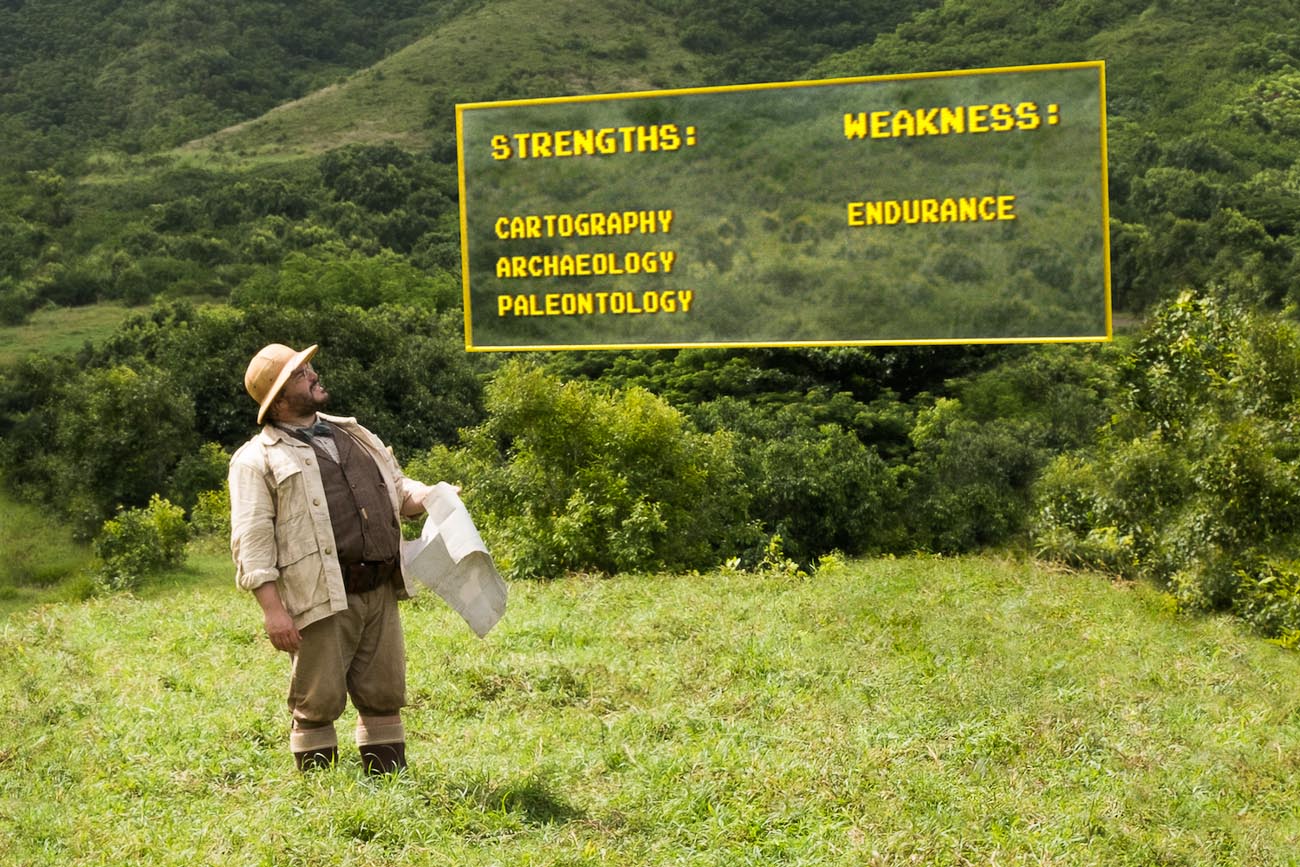
Bethany (as Dr. Shelly Oberon, a.k.a. Jack Black) is the only character who can read maps. So why does a game exist in which 4 of the 5 playable characters wouldn’t be able to find their way around the map? That doesn’t matter; what does matter is that this skill starts to help Bethany see value in developing a talent beyond simply being physically alluring.
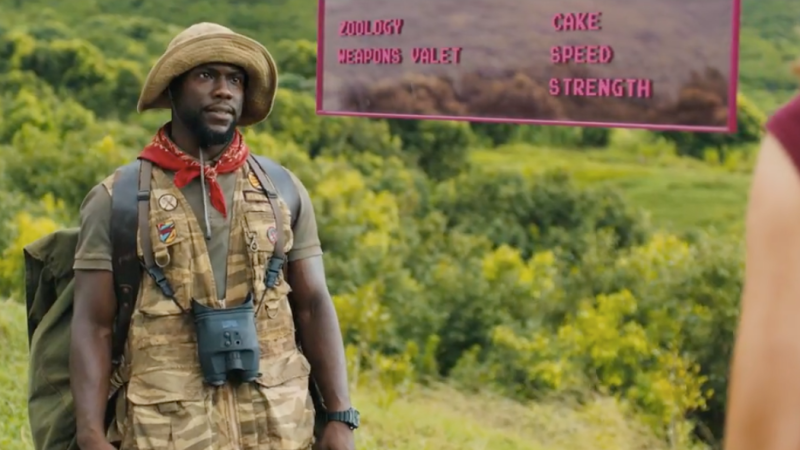
Fridge (as Franklin “Mouse” Finbar, a.k.a Kevin Hart) becomes a zoologist and a “weapons valet” for the main character. So why would the game allow you to play as a character who’s literally too slow or weak to survive any of the combat or trap elements? That doesn’t matter, because existing as the sidekick to the main character forces Fridge to find value in a friendship he had previously allowed to fail.
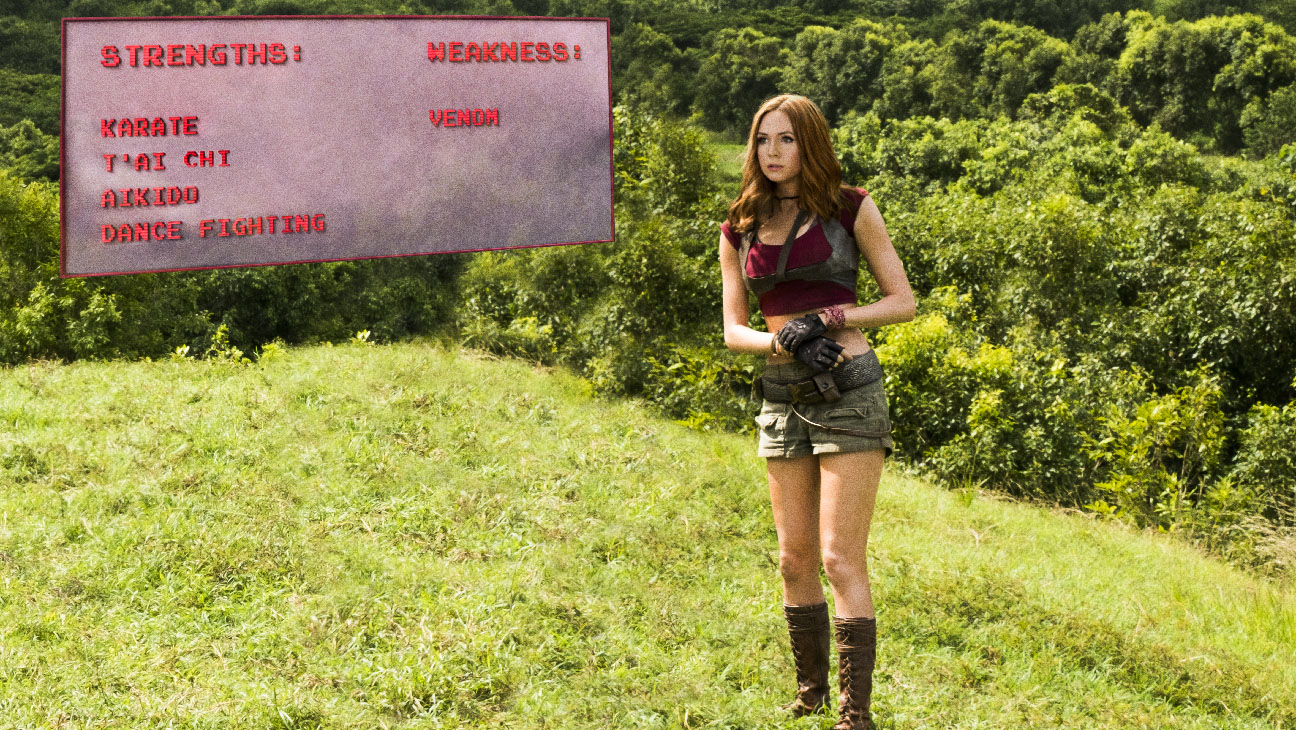
Martha (as Ruby Roundhouse, a.k.a. Karen Gillan) plays as a fighting machine whose fatal weakness is snake venom. So why would a character who automatically dies from a snakebite be running around the jungle wearing next to nothing? That doesn’t matter, because her kick-ass mobility and sex appeal are features that help introverted Martha develop her own inner confidence.
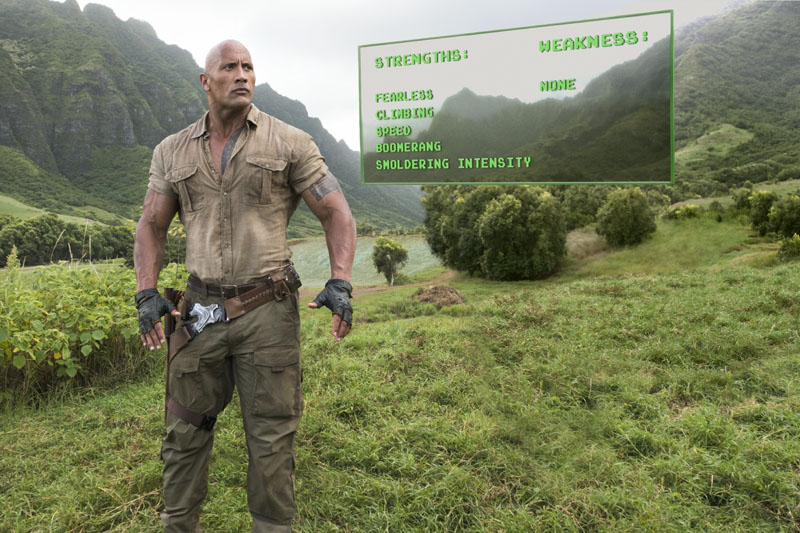
Spencer (as Dr. Smolder Bravestone, a.k.a. Dwayne “The Rock” Johnson) inhabits the body of a perfect male specimen with no weaknesses. So why would any multiplayer game offer a playable character who’s so obviously stacked in comparison to every other option? That doesn’t matter, because Spencer is so timid and tentative by nature that his personality becomes the weakness that he must overcome in order to win the game.
All of which leads us to the win condition of the game — and, by extension, of the movie.
As Long As It Feels Earned, Emotion > Logic

You can taste the bright lights but you won’t get there for free
Like I said, you know how Jumanji is going to end from the moment you first see the trailer.
You already know that a PG-13 movie about four flawed teens getting trapped inside a video game is going to end with the kids overcoming their flaws and returning to the real world as better people.
You also know that you’re probably in for some obvious visual humor, tame sarcasm, and low-key hormonal hijinks — all of which happens, repeatedly.
And if you were seeing this movie because you hoped to be surprised, or thrilled, or because you wanted a shrewd dissection of pop culture tropes or gender roles, you’d probably be disappointed.
And yet… you’d still leave the theater satisfied.
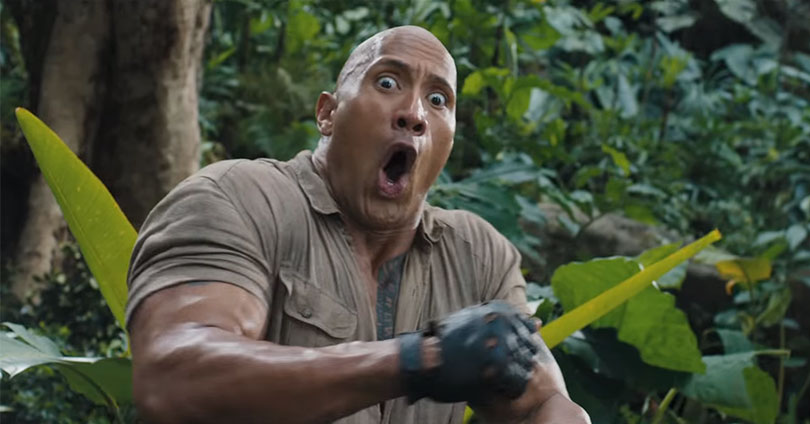
If you got the money, honey, we got your disease
That’s because Jumanji so smoothly sets up your desires, and the rules by which those desires can be fulfilled, that it only has to deliver the bare basics as far as earned emotional payoffs go and it’ll feel like the whole movie was a win.
And it does.
For me, Jumanji ultimately delivered on three emotional beats that I fully enjoyed despite my own cynicism.
First, there’s the obvious metaphor that’s been hiding in plan sight.
At the film’s climax, Spencer/Bravestone is afraid that he can’t perform the final task they need in order to win. Why? Because he only has one life left. As he says, “It’s easy to be a hero when you have lives to spare. It’s a lot harder when you only have one.”
Which is when Fridge/Mouse reminds him of the movie’s whole theme: “We always only have one life. It’s how you choose to live it that counts.”
Corny? Hell yes.
Did I tear up anyway? Yes, I fucking teared up at a Kevin Hart platitude. And another $300M worth of ticket buyers probably did too.
Then there’s the last-second gut check.
After they’ve won the game and are about to be sent home, Spencer/Bravestone stops Martha/Ruby and suggests they don’t leave Jumanji; that they stay there forever and keep living in their new, braver and more powerful bodies instead, because he likes who they are here.
“Then let’s be like this every day,” she tells him. “In the real world.”
And she goes home.
Fam, I got misty.
Finally, there’s the big emotional payoff you see coming but which still sticks the landing.
When the teens get back to reality, they can’t find Alex (Jefferson “Seaplane” McDonough, a.k.a. Nick Jonas), who should have rematerialized with them… shouldn’t he?
Later, as they’re walking home, they pass the decrepit “freak house” that Alex’s dad let fall into ruin ever since his son disappeared 20 years ago (when he got sucked into the game), and… the house is suddenly beautiful?
In fact, it’s decorated for Christmas.
And then a car pulls up, and a small child runs up the stairs to Alex’s beaming dad, and the teens realize that the grown man getting out of this car is… Alex, who’s now a dad of his own.
But wasn’t he a teen stuck in the game along with them? One who, in fact, Bethany was starting to fall in love with?
Turns out that when you win the game, it sends you back to the time when you entered it, so Alex popped out back in the 1990s despite having been trapped in the game for 20 real-world years. He’s been living this whole time knowing that four kids would someday rescue him in the future.
And he named his first daughter Bethany. “After the girl who saved my life.”
ACTUAL TEARS, people.
Damn it, a Rock movie made me cry.
No wonder this market-optimized corporate megalith that’s going to spawn a lifetime of sequels has made a billion fucking tear-stained dollars around the world.
So, is Jumanji: Welcome to the Jungle a model example for every action-comedy screenwriter?
No, it is not.
But…
If you strip away all its faulty plot logic, you’ll find a story that connects its emotional dots into a satisfying whole.
And, in the end, emotion, not logic, is why we go to the movies.
If You Liked This Post…
… then you may also enjoy these:
The Biggest Story Problems in Jurassic World: Fallen Kingdom
WandaVision’s Biggest Question Gets Deep: Who Are We, Really?


2 Comments
Marshall · May 7, 2018 at 3:19 pm
Excellent post. I actually linked to it on my own breakdown of plot structure in Jumanji. The movie is simple, silly yet surprisingly satisfying. They got me with “the girl who saved my life” as well. Lol.
Movie Structure Breakdown: Jumanji: Welcome to the Jungle – · May 7, 2018 at 2:18 pm
[…] and as a sequel to the original. I had intended to touch on the reasons why in this post, but Justin Kownacki did such an excellent job summing up why the movie succeeds at being emotionally sat… that I decided to just link to that. Check it out, it’s a good […]